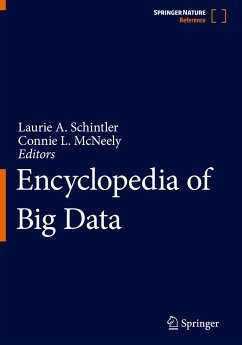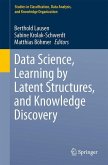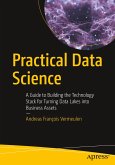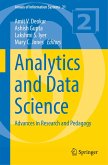This encyclopedia will be an essential resource for our times, reflecting the fact that we currently are living in an expanding data-driven world. Technological advancements and other related trends are contributing to the production of an astoundingly large and exponentially increasing collection of data and information, referred to in popular vernacular as "Big Data." Social media and crowdsourcing platforms and various applications "apps" are producing reams of information from the instantaneous transactions and input of millions and millions of people around the globe. The Internet-of-Things (IoT), which is expected to comprise tens of billions of objects by the end of this decade, is actively sensing real-time intelligence on nearly every aspect of our lives and environment. The Global Positioning System (GPS) and other location-aware technologies are producing data that is specific down to particular latitude and longitude coordinates and seconds of theday. Large-scale instruments, such as the Large Hadron Collider (LHC), are collecting massive amounts of data on our planet and even distant corners of the visible universe. Digitization is being used to convert large collections of documents from print to digital format, giving rise to large archives of unstructured data. Innovations in technology, in the areas of Cloud and molecular computing, Artificial Intelligence/Machine Learning, and Natural Language Processing (NLP), to name only a few, also are greatly expanding our capacity to store, manage, and process Big Data. In this context, the Encyclopedia of Big Data is being offered in recognition of a world that is rapidly moving from gigabytes to terabytes to petabytes and beyond.
While indeed large data sets have long been around and in use in a variety of fields, the era of Big Data in which we now live departs from the past in a number of key respects and with thisdeparture comes a fresh set of challenges and opportunities that cut across and affect multiple sectors and disciplines, and the public at large. With expanded analytical capacities at hand, Big Data is now being used for scientific inquiry and experimentation in nearly every (if not all) disciplines, from the social sciences to the humanities to the natural sciences, and more. Moreover, the use of Big Data has been well established beyond the Ivory Tower. In today's economy, businesses simply cannot be competitive without engaging Big Data in one way or another in support of operations, management, planning, or simply basic hiring decisions. In all levels of government, Big Data is being used to engage citizens and to guide policy making in pursuit of the interests of the public and society in general. Moreover, the changing nature of Big Data also raises new issues and concerns related to, for example, privacy, liability, security, access, and even the veracity of the data itself.
Given the complex issues attending Big Data, there is a real need for a reference book that covers the subject from a multi-disciplinary, cross-sectoral, comprehensive, and international perspective. The Encyclopedia of Big Data will address this need and will be the first of such reference books to do so. Featuring some 500 entries, from "Access" to "Zillow," the Encyclopedia will serve as a fundamental resource for researchers and students, for decision makers and leaders, and for business analysts and purveyors. Developed for those in academia, industry, and government, and others with a general interest in Big Data, the encyclopedia will be aimed especially at those involved in its collection, analysis, and use. Ultimately, the Encyclopedia of Big Data will provide a common platform and language covering the breadth and depth of the topic for different segments, sectors, and disciplines.
Hinweis: Dieser Artikel kann nur an eine deutsche Lieferadresse ausgeliefert werden.
While indeed large data sets have long been around and in use in a variety of fields, the era of Big Data in which we now live departs from the past in a number of key respects and with thisdeparture comes a fresh set of challenges and opportunities that cut across and affect multiple sectors and disciplines, and the public at large. With expanded analytical capacities at hand, Big Data is now being used for scientific inquiry and experimentation in nearly every (if not all) disciplines, from the social sciences to the humanities to the natural sciences, and more. Moreover, the use of Big Data has been well established beyond the Ivory Tower. In today's economy, businesses simply cannot be competitive without engaging Big Data in one way or another in support of operations, management, planning, or simply basic hiring decisions. In all levels of government, Big Data is being used to engage citizens and to guide policy making in pursuit of the interests of the public and society in general. Moreover, the changing nature of Big Data also raises new issues and concerns related to, for example, privacy, liability, security, access, and even the veracity of the data itself.
Given the complex issues attending Big Data, there is a real need for a reference book that covers the subject from a multi-disciplinary, cross-sectoral, comprehensive, and international perspective. The Encyclopedia of Big Data will address this need and will be the first of such reference books to do so. Featuring some 500 entries, from "Access" to "Zillow," the Encyclopedia will serve as a fundamental resource for researchers and students, for decision makers and leaders, and for business analysts and purveyors. Developed for those in academia, industry, and government, and others with a general interest in Big Data, the encyclopedia will be aimed especially at those involved in its collection, analysis, and use. Ultimately, the Encyclopedia of Big Data will provide a common platform and language covering the breadth and depth of the topic for different segments, sectors, and disciplines.
Hinweis: Dieser Artikel kann nur an eine deutsche Lieferadresse ausgeliefert werden.








